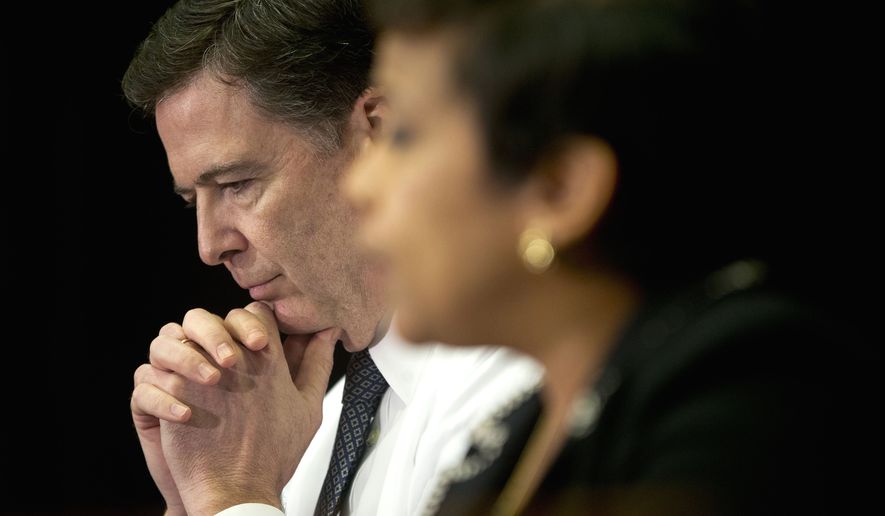Former Attorney General Loretta E. Lynch denied that she instructed former FBI Director James B. Comey to refer to the Hillary Clinton email probe as a “matter,” undercutting Mr. Comey’s claims otherwise.
Ms. Lynch told congressional investigators in December 2018 that she was “quite surprised” when she learned Mr. Comey said she had given such an instruction, as the Justice Department was weighing how to characterize things in the early stages of the investigation.
“That was not how it was conveyed to him, certainly not how it was intended,” she said, according to a congressional transcript released this week. “I have never instructed a witness as to what to say specifically. Never have, never will.”
Ms. Lynch told House investigators that in a meeting around September 2015, she and Mr. Comey were trying to figure out how to talk about the issue and that they weren’t ready to confirm or deny whether there was, in fact, an investigation into Mrs. Clinton’s email practices.
“[That’s] department policy, that when we receive a public referral from any agency, that we confirm the referral but we neither confirm nor deny the investigation,” she said. “That’s actually a standard DOJ policy.”
Mr. Comey had testified to lawmakers in 2017 that Ms. Lynch directed him to call it a “matter” rather than an “investigation,” saying the request confused and concerned him.
“That was one of the bricks in the load that led me to conclude I have to step away from the department if we are to close this case credibly,” he said, saying the language troubled him because it was similar to how the Clinton campaign was describing the issue.
Mr. Comey has emerged as a prominent critic of President Trump and his administration since getting fired in March 2017, penning a book, and making various media appearances.
Rep. Doug Collins of Georgia, the top Republican on the House Judiciary Committee, released the Lynch transcript and a batch of others this week that stemmed from a congressional investigation into potential FBI and Justice Department misconduct during the 2016 presidential campaign.
Ms. Lynch announced in July 2016 she would accept whatever the FBI recommended in terms of potential prosecution of Mrs. Clinton in the email case, saying a recent meeting with former President Bill Clinton on an airport tarmac had raised questions about her involvement.
Mrs. Clinton, the Democratic presidential nominee in 2016, had set up a private email and server to conduct business while serving as secretary of state under President Obama. That decision, her subsequent conflicting explanations for doing so, and a drip of revelations about classified information being handled became a major issue in the 2016 presidential race.
Ms. Lynch estimated that her conversation with Mr. Clinton lasted just under 10 minutes, telling investigators that there was no talk about either Mrs. Clinton or her presidential campaign. But she eventually felt the conversation was going on “too long,” she said.
“I thought that not only did we need to move on, he didn’t seem to have any particular purpose in talking to me — you know, there was nothing specific he seemed to want to say,” she said. “Certainly as we were leaving, I felt that … it certainly was going to raise a potential issue in the appearance of how the case was being handled.”
Shortly thereafter, Mr. Comey said in July 2016 that while Mrs. Clinton had been “extremely careless” in her email practices, no reasonable prosecutor would bring charges tied to mishandling classified information.
Multiple witnesses, including James Rybicki, a former chief of staff to Mr. Comey, told investigators in the newly released transcripts that Mr. Comey initially drafted the statement on the investigation he delivered on July 5, 2016.
Trisha Anderson, a former principal deputy general counsel at the FBI’s Office of General Counsel, said in August 2018 neither she nor anyone else of whom she was aware made edits or suggestions to the statement to help Mrs. Clinton or damage the Trump campaign.
Mr. Comey said in October 2016 that the FBI had found emails from another investigation that could be relevant to the Clinton email case. He then informed lawmakers in November, right before the presidential election, that they were sticking with the conclusions from July.
Many Democrats believe Mr. Comey’s role in raising the email issue that late in the race cost Mrs. Clinton the election against Mr. Trump.
But Andrew McCabe, the former FBI deputy director who was ousted by Mr. Trump last year, said Mr. Comey’s public statements about the investigation were never intended to affect the outcome of the election.
“I think Director Comey was very interested in us completing our work in a period of time that would be far enough before the election took place so that we could take whatever steps we needed to take, and do it in a way that would not impact the election,” he told investigators in December 2017.
Mr. Trump fired Mr. Comey in March 2017, paving the way for the appointment of special counsel Robert Mueller, who recently released his report on Russian interference in the 2016 election.
Contrary to statements from the White House, Mr. Rybicki said he didn’t think the FBI rank-and-file had lost confidence in Mr. Comey in the run-up to his firing.
“I think there was … sadness to lose Director Comey personally, but also determination that the work of the Bureau would continue no matter who was leading,” he told investigators.
• David Sherfinski can be reached at dsherfinski@washingtontimes.com.




Please read our comment policy before commenting.